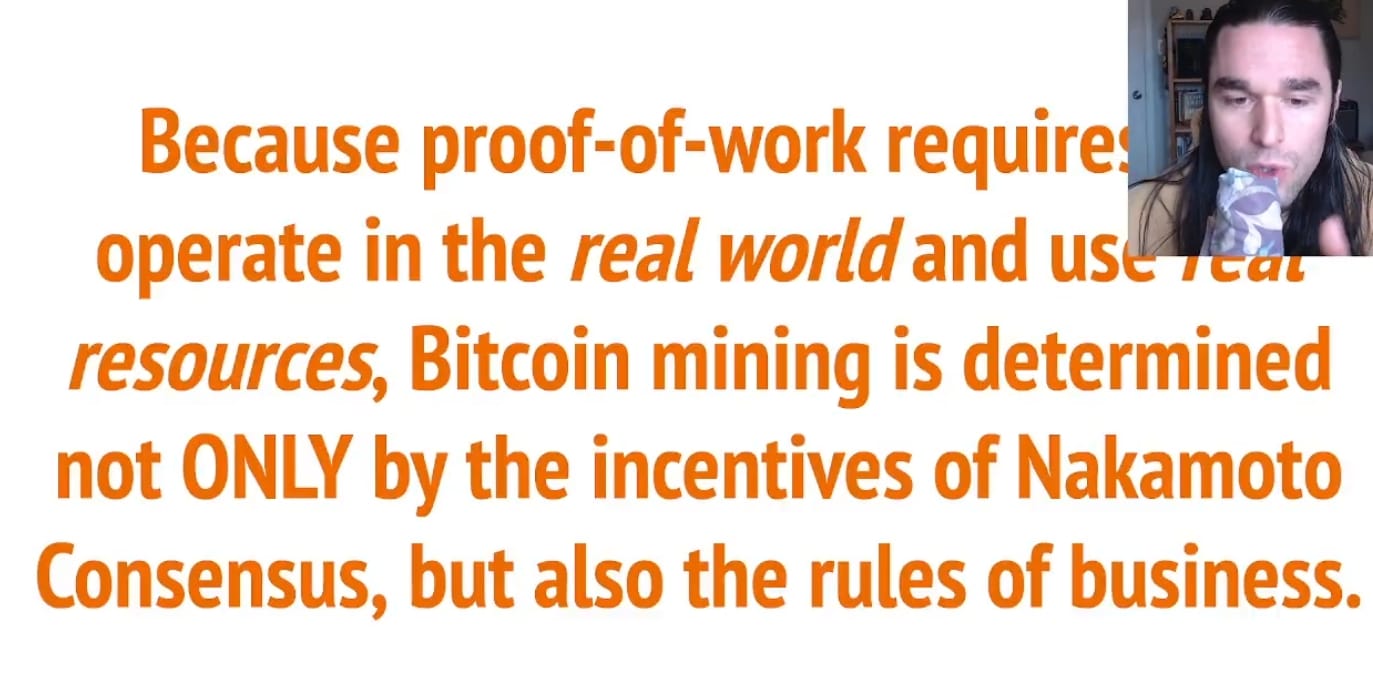Response to Rob Warren's Video
Rob Warren (no relation, AFAIK) recently posted a video on Twitter responding to some of my security budget FUD. It's a good video. (Elon has been trying to play hardball with suppressing links, so I'm obviously going to do my part and not link his website.) I'm happy to discuss these responses; I've heard various forms of these objections and it's nice to have them clearly stated so I can respond to them. Rob has written a book on Bitcoin mining. I haven't read it, but it appears to be selling much better than mine on Amazon.
Rob dives into the reasons why the first glance "security budget" claims don't tell the whole picture. He's right of course, my complaints are a first approximation to the problem and you have to look at other factors that might play a role.
At this point in time, my contribution to the discourse is to hammer away on the fact that Bitcoin's future is far too uncertain to treat as "digital gold." In the context of the current topic at hand, it would be incredibly risky to spend some chunk of a trillion dollars to buy 1 million coins and lock them away for 20 years, hoping to erase 250 years of growing debt. The uncertainty I'm discussing is not just in terms of animal spirits involved in the FOMO/rugpull dynamics, but in terms of the actual stability of the blockchain as the mining economics undergo a phase transition in the next 20 years. I'm not claiming certain doom, only that doom is a reasonably expected possibility; An argument that Bitcoin avoids doom requires some faith in things that have yet to materialize.
Rob points out that there are many other factors that are missed by distilling the question of security down to a number, objecting to the use of this number (block subsidy + fees) as the "security budget" as it misses factors that incentivize miners to keep mining in an honest way.
He's right, however, I think the other factors he brings into the discussion don't add certainty: They make doom scenarios less certain, but on the other hand they introduce uncertainty in other ways, ways that are quite fun to think about from an economic perspective.

Ideological mining
Ideological mining describes miners who aren't necessarily trying to maximize profit with everything they do, the same way that a CEO is trying to maximize shareholder value. Many smaller miners mine Bitcoin because they are excited about Bitcoin and want to help the movement by running their own machine. Home miners contribute to the decentralization, which in turn contributes to bitcoin actively being what it was intended to be. There's plenty of positive feedback loops here, especially when Bitcoin is on its way up.
While many home miners might be still turning a profit, my guess it that there are many who are making little or none, all costs (opportunity included) considered. Many of these are probably making money in dollar terms, as they are paying dollars for electricity in exchange for Bitcoin while Bitcoin is on the way up. It isn't clear how many are making money in Bitcoin denominated terms; some perhaps would have been better off simply buying Bitcoin with the same money. It's also quite likely that home miners revenues exceed their electricity costs day to day, but the total profits may not be enough to balance the capital costs of buying the machines: Pay $1500 for a machine that earns $18/day of bitcoin while costing $13/day to run - you might net a profit or not, depending on a bunch of things.
Buying equipment is both like a Costco membership and also a call option; you've already spent the capital costs, so you now have the ability to acquire Bitcoin at somewhat less than market rate. This is especially pronounced if price surges, as there will be a lag before difficulty catches up and the discount will be significant.
Without a doubt, the vast number of small miners today prevent the network from being attacked. Most miners are invested, ideologically and financially in the network, and they wouldn't let an attack succeed. And today there are enough of them to thwart any attack.
Now here's where I see this as a vulnerability in the future. I highly doubt the share of these miners will stay what it is. Several reasons
1) Much of the esprit du corps felt by miners in the first 16 years of bitcoin will be gone in 20 years. In the early days, there was huge asymmetrical payoff to be part of getting Bitcoin off the ground. In 2045, Bitcoin will be old like email. This is especially true if financial institutions have joined the fray. I could imagine someone evangelically excited about Email running a server in 1991, but nobody today would go out of their way to support the greater mission of Email.
2)Mining will be increasingly a bad investment and really hard to justify for small players. Mining corporations are growing larger, and they are doing corporation things, like finding ways to vertically integrate, ways to secure preferential deals with suppliers and utilities. Unless there is hardy antitrust enforcement, this will lead to a "waterbed effect," in which better terms for more powerful buyers lead to a worsening of the terms of supply for less powerful buyers. Since the competition for hashrate is direct and brutal, it will become very difficult for a home miner to justify. There becomes a point when you can't justify, say, losing $20 a month so that you can help the world's financial institutions. Back when you were "sticking it" to the financial institutions this might have been worth it, but now that they've bought in, it's just throwing money away.
3) The effect of 2) is more pronounced if the price has stopped superdoubling every four years. If the price is high and somewhat stable over a few cycles, there's no more incentive to "get in" if this isn't going to net you anything significant.
One of the frequent question people ask when I bring up the security FUD is "why hasn't this happened yet?" The well-distributed small miners who are part of the team are a sufficient reason why there hasn't been an attacks and probably won't be for a few years. But machines become unprofitable after a few years, and then decisions have to made about replacing them with newer more expensive models. I strongly expect the number of home miners to decrease to well below 50% in the coming decades.
Grid stabilization / energy markets
Non-bitcoiners might not have heard of this, but it's a very fascinating topic, full of real-world wrinkles and rabbit holes. The basic idea is that by setting up arrangement with electricity suppliers, Bitcoin miners can use their capacity to curtail excess energy during surges and reduce use during shortages, they not only will be getting energy at negligible prices, but may also be earning money by essentially paying negative costs to mine. (This isn't some crazy Bitcoiner fantasy, it actually happens.) Additionally by becoming players in the energy futures markets, they have a whole extra wing to their business. Even if the company itself is spending $800m to earn $800m in Bitcoin, this can be part of a larger business model which is netting much healthier profits.
This could clash with ideological mining, or maybe not. It certainly creates a bunch of new risks. If the main driver of profits is not intrinsic to Bitcoin, a profit maximizing CEO could make decisions that have huge effects on Bitcoin, and not really care. We certainly don't know that Bitcoin is the only possible use of large quantities of curtailed energy. If we wake up and say, charging electric rocket batteries is now a better use of extra electricity than mining bitcoins with a warehouse full of old machines, the CEO could shift directions overnight without blinking. If a firm is grid stabilization first, mining second, they could drop Bitcoin completely during an attack.
The other interesting part of this is that if a chunk of miners are reliant on grid conditions, things could get really weird in a fee-dominated mining regime. Fee-sniping doesn't happen yet, it's generally a bad move when the block subsidy is high, but if fees are larger than the block subsidy it will make more sense to rewrite blocks when the opportunity arises. Now if some miners find themselves online and then offline, they are easy victims of fee-snipers. If you mine high-fee blocks and then go offline, miners in other geographical locations can just go ahead and snipe your fees, undercutting just enough to get other miners to choose their forks. Most of the well understood game theory of mining is modelled on the situation where the miners who are mining have high uptime. All sorts of attacks become feasible if a material chunk of miners goes offline for hours or days.
The other very fun attack surface that opens up is that Bitcoin becomes indirectly exposed to other markets. If I can slightly overpay Peter to spend electricity to do some high-intensity training of my latest LLM, I may be able to remove Paul's access to electricity for Bitcoin mining for the next three weeks. In the meantime my wife's hedge fund can focus on causing havoc with Bitcoin for fun and profit. Similarly if someone is launching a Soros-style speculative attack on Bitcoin, they probably have access to energy futures markets and now have other knobs to play with.
State level mining
While today it makes good sense for Bhutan to mine while the subsidy is good and the price is on the way up, I don't see this being a big thing in the future. At best a nation could make a few dollars, here and there, at worst they get involved in some sort of weird coalitional game. I've ranted on this a greater length while attacking Jason Lowery's thesis: see chapter 4, 5 and 6 here . In short, if nations are not mining for profit but for some sort of offensive or defensive reason, the line between offense and defense is immediately blurred and the situation breaks down into nation-state coalition forming in a way that wouldn't be good for Bitcoin.
It's been suggested that nations will run their own mining to ensure that they have the right to transact. What I don't like about this argument is that it would be a tacit acknowledgement that Bitcoin is not censorship resistant to anyone without the capacity to mine their own block. The same market mechanisms should always be in place, anyone can always pay the fee to get their transaction included. If miners not in Iran really wanted to censor Iranian transactions, they would just ignore blocks mined by Iran in the first place.
Mining for heat
The idea here is that instead of a heater, you could set up a bitcoin miner. I have no idea how practical or efficient this is. I imagine maybe an apartment building could have a boiler room that takes cold water and makes it hot and pumps it through radiators. Not my area of expertise but every building I've been in with a radiator has been very very old.
I wouldn't put one in my living room. They're noisy.
The issue is that the delta between mining for profit and just making heat has to be significant enough that you actually care. If you don't care that much, fun scenarios could arise. Suppose that millions of people are heating their homes with Bitcoin, but aren't always paying attention to Bitcoin, they could be used in an attack if they're all dialed in to a pool operator who decides one day to act maliciously. Some apartment manager who paid a contractor who is a subsidiary of some LLC somewhere doesn't have the same commitment.
Also there's the geographical issues that arise with grid stabilization. If mining goes off in the summer, or during the day, it could present opportunities when the network is not as secure.
It just gets more blurry
The less the security budget is, the more that it can be upset by fluctuations in other things. More importantly, if there are lots of extraneous things going on, the economics might fall into the usual consolidation patterns. You could also wake up one day and the entire mining industry is in the hand of few corporations who are focused on a larger industry; changes in the other industry will massively throw off incentives in unpredictable ways.


